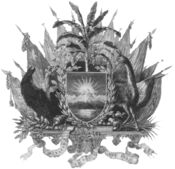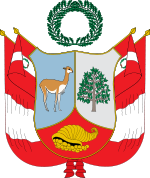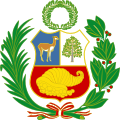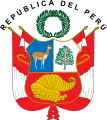- Coat of arms of Peru
-
National coat of arms of Peru 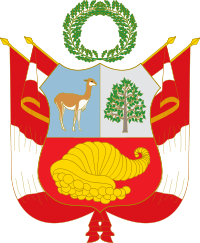
Versions 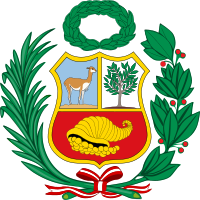
Coat of arms of Peru, used in the middle of the national ensign.Details Adopted 25 February 1825 Crest Holm oak Civic Crown Escutcheon Parted per fess and semi-parted per pale: Azure, a contorted vicuña; Argent, a cinchona tree; Gules, and a golden cornucopia Supporters A flag and a standard in each side. Other elements When used on the National ensign, a palm branch one on the left and a laurel one on the right, tied by a red and white ribbon. Earlier versions 21 October 1820 The coat of arms of Peru is the national symbolic emblem of Peru. Four variants are used: the coat of arms per se (Escudo de Armas); the national coat of arms, or national shield (Escudo Nacional); the great seal of the state (Gran Sello del Estado); and the naval coat of arms (Escudo de la Marina de Guerra).
Contents
Description
All four share the same escutcheon or shield, consisting of three elements: the top left section shows the vicuña, the national animal, on a light-blue field, representing the fauna of Peru; the tree in the top right section is the cinchona tree (the source of quinine, a powerful anti-malarial drug and the key flavorant in tonic water), on a white background, representing the national flora; and the bottom cornucopia with coins spilling from it, on a red field, represents the mineral resources of the country.
.
Variants
The coat of arms
The coat of arms (Escudo de Armas) has a palm branch on its left and an laurel one on its right, tied by a red and white ribbon, as well as a Holm oak Civic Crown above it. These represent victory and glory. This variant is used on the national ensign (Pabellón Nacional) or state flag. Its use on its own is infrequent, except on currency, both on coins and bills, and stamps.
The national coat of arms
The national coat of arms, or national shield (Escudo Nacional), consists of the shield plus a Peruvian flag and a standard on each side, and a Civic Crown as crest. It is used on the war flag (Bandera de Guerra). Its use on its own is mandated for all public buildings, with the name of the entity under it.
The Great Seal of the State
The Great Seal of the State (Gran Sello del Estado), consisting of the National Shield and the semicircular inscription "REPÚBLICA DEL PERÚ" ("Republic of Peru") above it, is used on official documents.
The Naval Coat of Arms (Escudo de la Marina de Guerra), consists of the National Shield and the semicircular inscription "Marina de Guerra del Peru", along with anchors instead of the traditional flags it is embedded upon, as well as having an image of the sun as the crest. It is used for various naval purposes.
History
First version
The first version of the Coat of Arms of Peru was designed by General José de San Martín and officially declared on 21 October 1820. It consisted of a landscape of the sun rising from the Andes, seen from the sea, and escorted by laurel branches tied with a golden ribbon.
In the shield, on a blue sky background, the sun's yellow rays can be seen behind the dark brown mountains rising above the blue and green ocean.
The flags of the South American nations and a banana tree can be seen behind the shield. A condor on the left and a llama on the right act as supporters.
All this was on top of a baroque base, with a scroll under it with the motto "Renació el sol del Perú" ("Peru's sun is reborn") in capital letters. Some flowers, branches and ammunition were on the base.
Second version
On 25 February 1825, Simón Bolívar and the Constituent Congress proclaimed a law defining the new national symbols. establishing the new Coat of Arms, similar to the one used today. This was designed by Congressmen José Gregorio Paredes and Francisco Javier Cortés. The official description was the following:
- "Las armas de la Nación Peruana constarán de un escudo dividido en tres campos (forma polaca), uno azul celeste, a la derecha, que llevará una vicuña mirando al interior; otro blanco, a la izquierda, donde se colocará el árbol de la quina; y otro rojo inferior y más pequeño en que se verá una cornucopia derramando monedas, significándose con estos símbolos, las preciosidades del Perú en los tres reinos naturales. El escudo tendrá por timbre una corona cívica vista de plano; e irá acompañada en cada lado de una bandera y un estandarte de los colores nacionales, señalado más adelante."
- "The arms of the Peruvian Nation shall consist of a shield divided into three fields (Polish shape), one light-blue, to the left, which will carry a vicuña looking inwards; another white, on the right , where a cinchona tree will be located; and another red below and smaller in which a cornucopia will be seen spilling coins, signifying with these symbols, the richnesses of Peru in the three natural kingdoms. The shield shall have as crest a Civic Crown seen flat; and shall be escorted on each side by a flag and standard of the same national colors, described later."
1950 modification
This is the coat of arms used today and is a modification of the second version. Until 1950, the coat of arms was a symbol of both the nation and the state, and presented some difficulties in its design. These generated that, months after its creation, that the seals of ministries modified the law, cutting the width of the shield to design the cornucopia comfortably, and getting rid of the escorting flags.
The last modification was in March 1950, during General Manuel A. Odría’s administration. In this way, the coat of arms was split in halves, and the lower section became the largest, rather than the smallest. The national coat of arms was created simultaneously as a heraldic symbol of the State.
-
The National Coat of Arms supported by branches, as used in the flag and in the nuevo sol coins and banknotes.
Flag · Coat of Arms · National Anthem · Cockade
Sovereign states Dependencies and
other territoriesCategories:- National symbols of Peru
- National coats of arms
- Peruvian coats of arms
Wikimedia Foundation. 2010.

